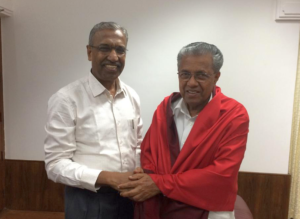The union ministry of finance is probing the 2018 appointment of TS Vijayan as a director of Yes Bank without obtaining a formal approval from the government. After issuing show cause notice, the ministry has reportedly appointed United India Insurance Company’s chief vigilance officer (CVO) R Balasubramanian, as the inquiry officer, to probe the matter.
The controversial former chairman of the Insurance Regulatory Development Authority of India (IRDAI) had been given the job of insurance regulator under the United Progressive Alliance (UPA), despite the ignominy in 2011 of being demoted to mere managing director, while he was chairman of the Life Insurance Corp of India (LIC) .
He also faced a probe by the Central Bureau of Investigation (CBI) and the Central Vigilance Commission (CVC). Despite this, his appointment to IRDAI, a regulatory position, was cleared on the personal recommendation of P Chidambaram, after he returned to the finance ministry in 2013.
Even while he was at IRDAI, there have been several allegations against him following relentless questions raised by a whistleblower through Right To Information (RTI) applications. They pertained to how his conduct as the perks that he gave himself, which were beyond his entitlement.
As regards the latest action, a report from Economic Times says, “The finance ministry is also probing if Vijayan had any role in informing the Kerala government about the Yes Bank crises in advance.
Months before the Reserve Bank of India (RBI) imposed a withdrawal limit of Rs50,000 per depositor in the Yes Bank, the Kerala Infrastructure Investment Fund (KIIF) withdrew all its funds of more than Rs250 crore from the bank.”

(TS Vijayan being welcomed by Kerala chief minister Pinarayi Vijayan)
Mr Vijayan joined the board of KIFF on 30 June 2020. In February 2018, Vijayan had retired as chairman of IRDAI and immediately in December, he became board member of Yes Bank.
As per the IRDAI Act, there is a bar on future employment of members. Section 8 of the Act says, ” The chairperson and the whole-time members shall not, for a period of two years from the date on which they cease to hold office as such, except with the previous approval of the central government, accept- (a) any employment either under the central government or under any state government; or (b) any appointment in any company in the insurance sector.”
While the IRDAI Act does not bar Mr Vijayan from becoming director of Yes Bank, he was mandated to seek prior approval from the government before accepting the job.
As per the report from ET, Yes Bank is corporate agent to insurance companies including Max Life and Reliance General Insurance, which are directly regulated by IRDAI.
In 2018, Yes Bank was grappling with increasing non-performing assets (NPAs) as well as resignation of three of its directors, including chairman Ashok Chawla. In December that year, it decided to appoint TS Vijayan as additional director with independent charge of Yes Bank for five years.
Interestingly, Mr Vijayan was also a key member of the search & selection committee (‘S&SC’) set up to identify a suitable successor for Rana Kapoor as new MD & CEO of Yes Bank.
However, in March 2020, the ministry of finance, through a gazette notification, put a moratorium on Yes Bank till 3 April 2020 and superseded its board of directors. The Bank, fourth largest private sector lender in India, has been asked not to pay any depositor more than Rs50,000 from any account including saving, current or any deposit account.
Before assuming charge as chairman of IRDAI in 2013, Mr Vijayan held several senior leadership positions in various capacities in the Life Insurance Corporation of India (LIC), India’s largest Insurance company, and assumed responsibility as its Chairman in 2006. His career in LIC started as a direct recruit officer in 1977 and some of the important assignments held by him were managing director of LIC, executive director (IT & BPR), director and chief executive of LIC Housing Finance Ltd.
In May 2011, Mr Vijayan was demoted as managing director after a five-year term as the chairman of LIC, an unusual first in the history of the country’s largest insurer.




Average Rating